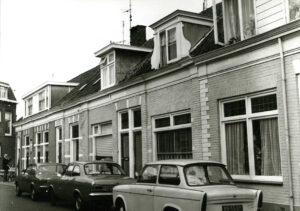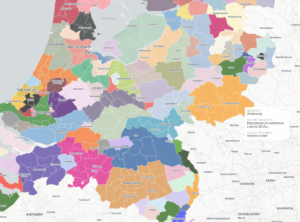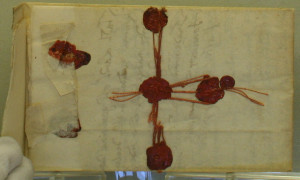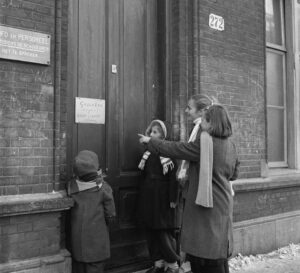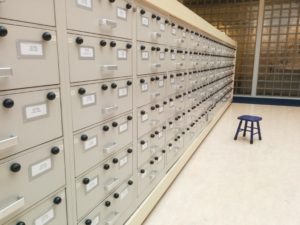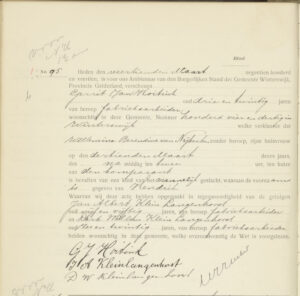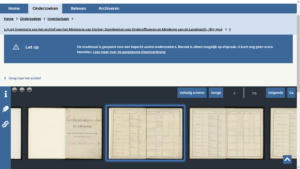Here are the ten record groups I use for virtually any research project where I want to know more than just names, dates, and places. When you find an ancestor in a new-to-you place, try finding out where all of these records are kept. See the post on Which archive keeps the records of your Dutch ancestor to learn how to find the archives for a particular place. Many of these records have been scanned and indexed and can be consulted on the websites of the archives where they are kept, at … [Read more...]
Quick Tip – Check the websites of the archives
Not all information that is kept in Dutch archives is available via national websites like WieWasWie or Open Archives. You can check the map of archives in the Netherlands to see where the records are kept for the place where your ancestors lived. Often, the websites of the archives will have additional information. This can include images of the towns, finding aids with scans of unindexed records, or newspapers. You may even be able to find photos of the streets where your ancestors lived. … [Read more...]
Quick tip – Order records in advance
If you are visiting a Dutch archive in person, please check their website. Often, you can order records in advance. That way, the records will be waiting for you when you arrive, and you can start your research right away. Some archives provide an order button from the catalog, while others allow you to email a list of the records you want to consult. … [Read more...]
Which archive keeps the records for your Dutch ancestors?
In the Netherlands, most government records about our ancestors are created and kept at three different levels: Municipal level Provincial level National level. All these authorities have agreements with archives to keep the records that are over twenty years old. Municipalities either have their own city archives, or collaborate in a regional archives. Each provincial capital has an archive for records created at the provincial level, but that archive often also keeps records of … [Read more...]
Dutch term – Beschikbaar, beschikbaarheid
Beschikbaar means available; beschikbaarheid means availability. You may come across the terms in finding aids and texts discussing how to consult records. For example, a finding aid may include a section about availability to discuss where the records are kept, how they can be accessed, whether they are available online, or whether there are access restrictions to consider. … [Read more...]
Dutch term – Openingstijden
Openingstijden are opening hours. If you want to visit an archive, check their website for opening hours. Some archives require making an appointment or booking a seat. Archives increasingly have virtual opening hours too, where you can chat with a reading room attendant to ask questions about your research. This chat service can be very helpful if you have quick questions about using the website or which sources to use for your research. … [Read more...]
The three most relevant archives
When you are researching, there are archives/repositories at three different levels that may hold relevant records for you. They correspond with the three levels of government: municipality, province, and country. Local or regional archives Each municipality turns over their records to a local or regional archive. Examples of local archives are the Amsterdam City Archives or the Oldenzaal city archives. These municipalities have their own archivist rather than using the services of a regional … [Read more...]
Quick tip – Check the finding aid or catalog for scans
When you are searching for your ancestors, it's tempting to stick to searching for their name in an online index. But only a small fraction of records have been indexed. A larger part is available online as images that have not been indexed yet. These images are often available via the catalog or finding aids on the website of archives. Look for terms like inventarissen or archieven. In some cases, the records have not been scanned yet, but the catalog or finding aid has a button to order … [Read more...]
Quick tip – Check websites of local archives
When you're researching, don't limit your research to national or international websites like Open Archives or Ancestry. Also check the websites of local archives. Every municipality in the Netherlands has a contract with an archive to keep their records. This can either be an archive specific for that one municipality, or a regional archive that keeps the records of multiple municipalities. Some recent finds I made on websites of local archives: Mill tax records of Etten-Leur showed the … [Read more...]
National Archive Launched New Presentation (Beta)
The National Archives just launched the beta version of its new catalog to search and view their records. This happens to be a project I have been working on myself, in the one day per week I do IT projects for archives. I have been managing the migration of 14 million scans from the new system to the old, and consulting on building the new presentation which will have 30 million scans by the official launch. The beta already provides access to millions of new scans. Try the new … [Read more...]

